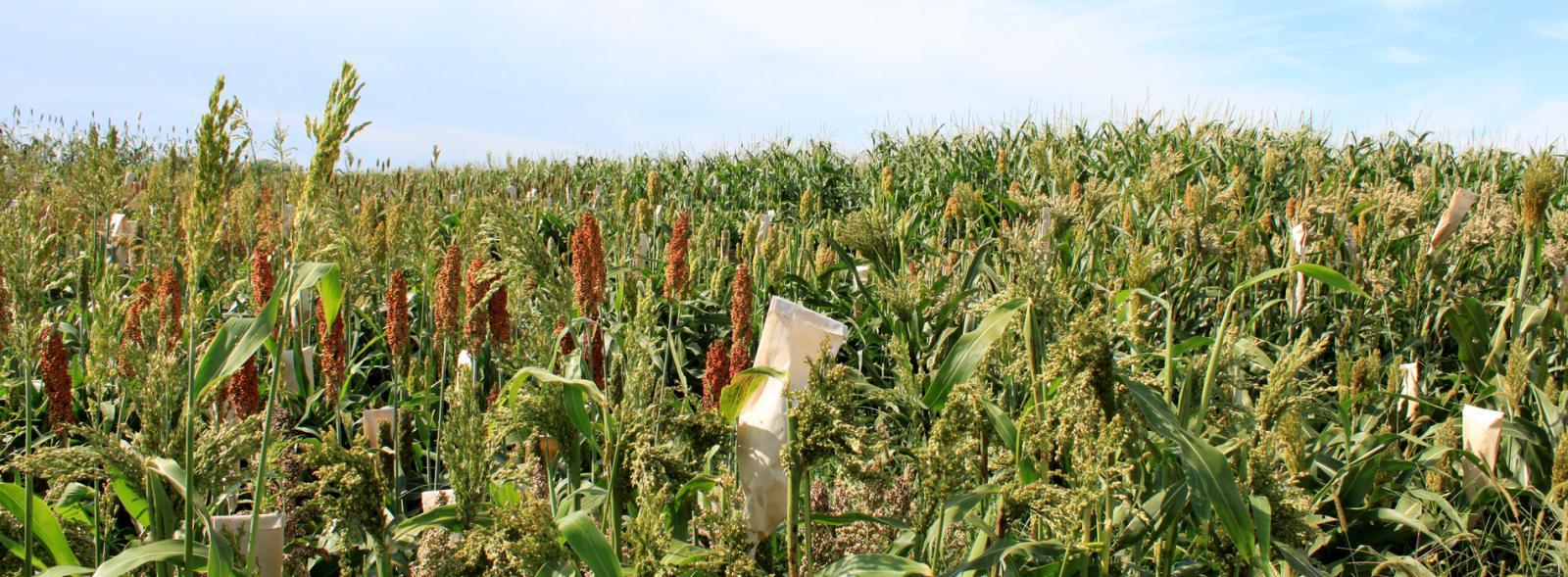Instructor(s): Blaine Johnson
Number of Credit Hours: 3
Fall Semester 2025: The sessions are in-classroom for resident participants with synchronous remote connection for remote participants.
Prerequisites:
- Required: Permission of instructor
- Recommendations: Minimum of one semester of undergraduate or graduate level genetics; Minimum of one course in plant breeding.
- Please contact the instructor for questions on prerequisites.
Description: AGRO 896-Introduction to Hybrid Breeding (AGRO-896 Independent Study) is a three-hour (3 credits) course. The course is a treatment of hybrid breeding, with topics including: (a) Defining a comprehensive and sustainable hybrid breeding program that creates, evaluates, and releases or commercializes genetically improved hybrids, (b) Definitions, and terminology of hybrid breeding, as used to describe germplasm, breeding populations, and breeding families as well as descriptions of the multiple stages of parental line development and hybrid evaluation and advancement; (c) Heterosis and the development and utilization of heterotic groups and germplasm pools for both parental line development and hybrid development; (d) Designing and implementing a comprehensive, end-to-end breeding program that is both reciprocal and recurrent; and (e) Developing and managing the logistical components of a hybrid breeding program. Knowledge and experience are gained through a combination of recorded lectures and interactive workshops centered on real-world hybrid breeding examples. Topics, examples, and projects draw heavily from maize breeding with a strong industry perspective.
Who should take this course: Individuals who want to learn the basics of or otherwise extend their knowledge of hybrid breeding. The course is open to upper-level undergraduates, and to graduate students who want to learn the fundamentals of breeding a hybrid crop.
Why take this course: A large proportion of career opportunities in plant breeding are those associated with hybrid breeding, with opportunities in maize/corn breeding being dominant. This course is offered as an introductory course in hybrid breeding wherein participants build/extend their knowledge of breeding a hybrid crop. A core focus is making effective decisions when building the structure of a hybrid breeding pipeline. Many examples used in the course are based upon the hybrid maize breeding model.
How course is taught: Foundational knowledge on hybrid breeding is delivered via pre-recorded lectures, made available through Canvas and/or Microsoft Teams. Course participants view the lectures at their discretion, then participate in two per week live sessions, discussions/help sessions on Mondays from 12:00-1:30, and live discussions/help sessions on Wednesdays from 12:00-1:30. Participation is either in-classroom for resident participants or live-remote for distance participants. Active participation is required for both weekly sessions.
The pre-recorded Lectures cover one or more topics that collectively provide the background needed for the discussions and workshops. Purpose of discussions is to clarify and extend learnings from the pre-recorded lectures; help sessions are open time with the course instructor for help with course content, or other discussions on all things plant breeding; Workshops are group-based and provide hands-on experience making plant breeding decisions, using a variety of concepts, tools, and methodologies covered in the lectures. The course is three credit hours and extends over the full fall semester.
This course is designed to help early career plant breeders develop their knowledge, skills and experience in hybrid breeding by extending his/her (1) technical knowledge, (2) practical experience, and (3) critical thinking skills in hybrid breeding through:
- Understanding the wholistic process of hybrid breeding where the goal is continuous and sustainable release or commercialization of genetically improved hybrids over time and breeding generations;
- Building knowledge of terminologies and vernaculars commonly used hybrid breeding;
- Developing and extending his/her knowledge of germplasm pools and the use of those pools in hybrid breeding and product development;
- Developing basic knowledge of theoretical considerations when making selection and advancement decisions;
- Developing and extending her/his ability to design an effective and efficient hybrid breeding pipeline, for both parental line development and hybrid development, under resource constraints;
- Building knowledge on the implications of intellectual property in hybrid breeding;
- Enhancing her/his ability to recognize and respect the value of diverse perspectives, backgrounds, and ideas, and to effectively promote and utilize that diversity when making plant breeding decisions and managing a hybrid breeding program.
- Enhancing her/his ability to think, think, THINK! Analytically, logically, and critically!
